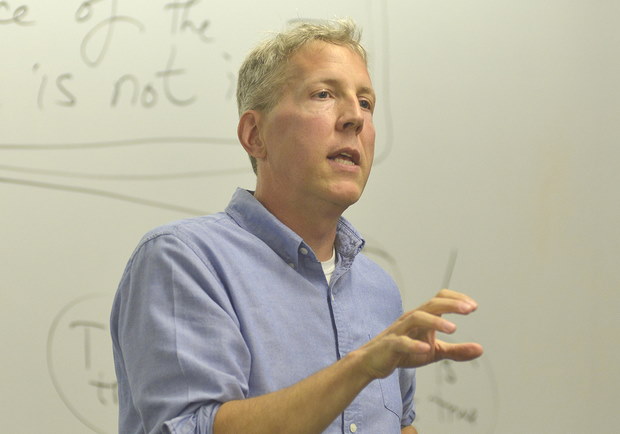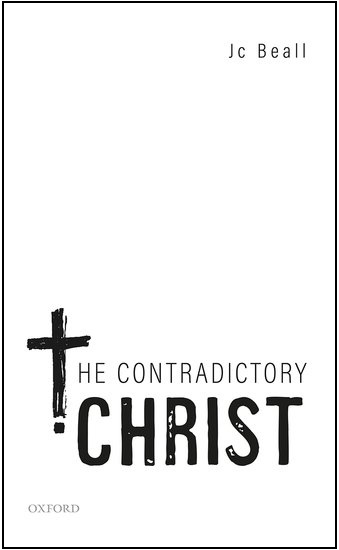Podcast: Play in new window | Download
Subscribe: Spotify | Email | RSS

Consider the sentence “This sentence is false.” If it is true, then (as it says) it is false. And if it is false, then what it says (i.e. that it’s false) must be true. Why not, then, say that the sentence is both true and false?
In this episode Dr. Beall argues that if one says instead that the above sentence is neither true nor false, that may be plausible, but the same answer won’t work for this sentence: “This sentence is either false or neither true nor false (aka ‘gappy’).” If the sentence is true, this requires one side or the other of the disjunction to true – so it must be either false or neither. But if it can’t be both true and false, we must reject the first option. And we must reject the second option too, for if it is neither true nor false, then it can’t also be (as we’re supposing) true. It can’t then, be (only) true. But can it be either false or neither? It would seem not. Suppose it is false: that would require the falsity of both disjuncts, both that it is false (d’oh!) and that it is neither. So it can’t be false. Could it be neither true nor false? No – because if it were, then the second disjunct would be true, and thus the whole sentence would be true.

It would seem simpler to say that if the sentence is false, then (because the first disjunct would thereby be true) it will also be true. And if it is true – again, this requires at least one disjunct to be true. If we pick the first, then it will be both true and false. And if we pick that it is neither true nor false (the right disjunct) – then it won’t be true. So it looks like the one way for it to be true is for it to also be false, and that the only way for it to be false requires it also to be true. It looks like we should say that this sentence is both true and false.
Now if (1) for entirely non-theological reasons we have reason to believe that there can be true contradictions, and if (2) as Dr. Beall explained last time, all the attempts to make a divine-and-human Christ turn out consistent are problematic, and if (3) we have strong reasons to believe that Christ is both human and divine, then, as Dr. Beall argues here, why not just accept that the apparent contradictions of a divine-and-human Christ are not merely apparent but real, but nonetheless true (and false)?
Topics include:
- Why Dr. Beall doesn’t think relative identity theory helps.
- How people get the idea from a standard first university course in Deductive Logic that all contradictions are only false.
- The concepts of a logical vocabulary and of logic as universal and topic-neutral.
- Entailment relations generally, and the specific relation of logical consequence.
- The concept of logical possibility (which is broader than physical or metaphysical possibility).
- So-called “classical” logic as a controversial account of logical consequence, and why Dr. Beall rejects it.
- Truth-value “gaps” (where a claim is neither true nor false) and “gluts” (where a claim is both true and false).
- How the famous “liar paradox” supports the possibility of true contradictions.
- Why it won’t do to allow only truth-value gaps only, and not also gluts.
- The objection that contradictory christology ruins any hope of successful apologetic defense of the Incarnation.
- The objection that Christian tradition doesn’t allow for confessing certain claims as false.
- My objection that it is self-evident that nothing can be and not be a certain way at a single time – thus, there can’t be any contradictory beings, even if such are not ruled out by logic alone.
Do you agree that a doctrine of a divine-human Christ should be accepted even though it implies contradictions? Why or why not?
Links for this episode:

The Contradictory Christ (Amazon)
Dr. Beall’s homepage, page at Notre Dame
Relative Identity and Trinity theories
Joseph Jedwab, “Against the Geachian Theory of the Trinity and Incarnation“
podcast 68 – Dr. Harriet Baber on Relative Identity and the Trinity
podcast 271 – Does your Trinity theory require relative identity?
an intro to philosophy lecture on “common sense” and radical philosophical claims
(on open theism) – podcast 80 – Foreknowledge, Freedom, and Randomness
podcast 221 – Thomas Reid on human prejudices and common causes of error
podcast 220 – Thomas Reid on First Principles and Common Sense – Part 2
podcast 219 – Thomas Reid on First Principles and Common Sense – Part 1
podcast 263 – Tuggy vs. Date debate – Jesus is human and not divine – Part 1
This week’s thinking music is “The Atmosphere” by Little Glass Men.

“My objection that it is self-evident that nothing can be and not be a certain way at a single time”.
But this “certain way” is only our flawed and imperfect perception of reality, as it relates to God’s being, at the end of the day.
Isaiah 40:18
To whom then will ye liken God? or what likeness will ye compare unto him?
Isaiah 46:5
To whom will ye liken me, and make me equal, and compare me, that we may be like?
I think these verses strengthen Beall’s argument. If Unitarianism is true these verses must be false in my view.
You should do a piece on Rob Koon’s suggestion that the trinity is a set of qua objects
@ Alex Toh [4.27.21]: Thank you for your engagement. I am not sure what you mean by `true in reality’. The only notion involved in the liar derivation is truth. The truth predicate “True” plays capture and release (where is an appropriate name of A, like a quotation name or etc):
Capture: for any sentence A in the language of the theory, True is entailed by A (by the meaning/semantics of truth).
Release: for any sentence A in the language of the theory, True entails A (by the meaning/etc).
Hence, consider a Liar like
* The starred sentence in this comment is false.
Capture demands that if the starred sentence is false then the starred sentence is true. Release demands that if the starred sentence is true then it’s false. Hence, the starred sentence is true iff false. Hence, if, per classical logic, the sentence is either true or false then it’s both.
Where does “true in reality” come from? What’s it’s semantics?
Deductive reasoning may be valid while being logically unsound.
From what I gather, Dr Beall’s logic is as follows:
P1. The sentence claims to be false explicitly.
P2. The sentence claims to be true implicitly.
C1. The sentence claims to be both true (implicitly) and false (explicitly); it is a logical contradiction.
P3. The logically contradictory sentence is possibly true in reality.
C2. Logical contradictions can be true in reality.
C3. Logical contradictions can be true of God.
I fail to see why we should accept premise 3.
Just Dr Beall affirms that mathematical propositions can only be either true or false, logical possibilities are contingent on the nature of reality, not the other way round. What is true or false is also contingent on reality; truth values can only be assigned if the proposition corresponds to reality.
Dr Beall’s sentence may cohere with reality, if and only if, it refers to another sentence that is entailed in reality. i.e. “2+2=5” or “Star Wars is a historical, non-fictional story”; “This sentence (referring to the sentence of 2+2=5) is false”.
But he used the sentence in a reflexive/self-referrant manner (“this sentence” refers to itself, not another sentence) and does not correspond to anything in reality. Since the sentence is not entailed in reality, it does not carry any truth value and should not be regarded in the “true/false” categories.
It is illogical to delineate what is true/false from reality, since the former is necessarily and objectively contingent on the latter.
If omniscience as commonly defined means that God knows all true propositions, can God know the sentence as a true proposition? I would argue that there is nothing true about the sentence to be known by God in his omniscience.
As far as I can tell, Dr Beall has not demonstrated how something that claims to be both true and false, is actually logically possible in reality. Furthermore, it is also unclear if logical contradictions are possible in reality, why should it be limited to God and not applicable to other things, say bible interpretation.
Comments are closed.